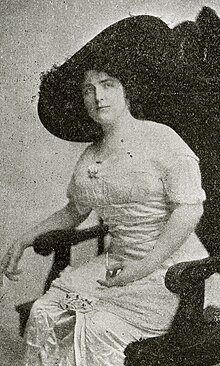| Belle Kinney Scholz | |
|---|---|
 | |
| Born | Belle Marshall Kinney 1890 Nashville, Tennessee |
| Died | 1959 (aged 68–69) |
| Nationality | American |
| Alma mater | Art Institute of Chicago |
| Known for | sculpture |
| Spouse | Leopold Scholz |
Belle Marshall Kinney Scholz (1890–1959) was an American sculptor, born in Tennessee who worked and died in New York state.
Early life
Belle Kinney was one of four children born to Captain D.C. Kenny and Elizabeth Morrison Kenny. She was born in Nashville, Tennessee. Belle Kinney won first prize at the 1897 Tennessee Centennial Exposition for a bust of her father.
Sculpting career

At age 15, Belle Kinney was awarded a scholarship to the Art Institute of Chicago, where she studied with Lorado Taft. In 1907, at age 17, she received her first commission, to sculpt the statue of Jere Baxter, organizer of the Tennessee Central Railway. Following her work at the Art Institute, Kinney maintained a studio in Greenwich Village, during which time she met Austrian-born sculptor Leopold F. Scholz (1877–1946). They married in 1921, and completed several other works together, including the Victory statue in the War Memorial Building court at Legislative Plaza, Nashville (1929) and the bronze figure of Victory for the World War I Memorial in Pelham Bay Park, Bronx, New York City (1933). They also created both works representing Tennessee in the National Statuary Hall Collection in the US Capitol in Washington D.C.
By 1948, Kinney was maintaining a studio in Chattanooga, Tennessee. Kinney died on August 27 or 28, 1959 at age 69 in Boiceville, Ulster County, New York.
Work

 Andrew Jackson (1927) and John Sevier (1931) at the U.S. Capitol, executed with Leopold Scholz
Andrew Jackson (1927) and John Sevier (1931) at the U.S. Capitol, executed with Leopold Scholz
- Bust of Richard Owen, Indianapolis 1913 (replica at Indiana University, Bloomington, Indiana)
- Women of the Confederacy, Jackson, Mississippi (1917)
- Tennessee Monument to the Women of the Confederacy, Nashville, Tennessee (1926)
- Jere Baxter statue, Jere Baxter School, Nashville (1907)
- Andrew Jackson statue, National Statuary Hall Collection, U.S. Capitol, Washington D.C. (1927)
- John Sevier statue, National Statuary Hall Collection, U.S. Capitol (1931)
- General Joseph E. Johnston statue, Dalton, Georgia (1912)
- Admiral Albert Gleaves bust, Annapolis, Maryland (1938)
- Andrew Jackson bust, Tennessee State Capitol, Nashville
- James K. Polk bust, Tennessee State Capitol, Nashville
- John Ross bust, Hamilton County Courthouse, Chattanooga, Tennessee (1958)
- Alexander P. Stewart bust, Hamilton County Courthouse, Chattanooga, Tennessee (1911)
- Victory statue, Bronx County World War I Memorial in Pelham Bay Park, New York City, with Leopold Scholz (1933)
- Victory statue, War Memorial Auditorium, Legislative Plaza, Nashville, with Leopold Scholz (1929)
- Pediment sculptures of the Nashville Parthenon, with Leopold Scholz (1920–30)
- Bronze bust of David Crockett, Trenton, Tennessee (1950)
References
- Van West, Carroll (2010). "Belle Kenny". The Tennessee Encyclopedia of History and Culture. The Tennessee Historical Society and the University of Tennessee Press. Retrieved October 15, 2015.
- Coleman, Christopher K. (1990). "From Monument to Museum: The Role of the Parthenon in the Culture of the New South". Tennessee Historical Quarterly. 49 (3): 139–151. JSTOR 42626877.
- Architect of the Capitol, ‘’Compilation of Works of Art and Other Objects in the United States Capitol’’, United States Printing Office, Washington 1965 pp. 244, 259
- "Historical News and Notices". Tennessee Historical Quarterly. 7 (2): 186–192. June 1948. JSTOR 42620980.
- It is unclear when the spelling of her family name was changed to Kinney.
- The summary presented on 25 December 2009 in the Tennessee Encyclopedia of History and Culture gives her death date as 28 August. However, two obituaries both dated 28 August, in 2 newspapers (the New York Times, and the Toledo Blade ) state that she died "yesterday".
- "Belle Kinney, Sculptor, Dies". New York Times. August 28, 1959. ProQuest 114671411.
- Courier, Thomas J. (2000). The White House, the Capitol, and the Supreme Court: Historic Self-guided Tours. Arcadia Publishing. ISBN 9780738505572. Retrieved October 15, 2015.
- Van West, Carroll (2010). "Belle Kinney". The Tennessee Encyclopedia of History and Culture. The Tennessee Historical Society and the University of Tennessee Press. Retrieved October 15, 2015.
- "Historical News and Notices". Tennessee Historical Quarterly. 9 (3): 286–288. September 1950. JSTOR 42621049.
External links
- Image of John Ross bust
- Nashville Public Television profile on YouTube
- War Memorial Statue, Tennessee State Library and Archives
- War Memorial Statue, Tennessee State Library and Archives
- Belle Kinney (Scholz) in her New York Studio, Tennessee State Library and Archives